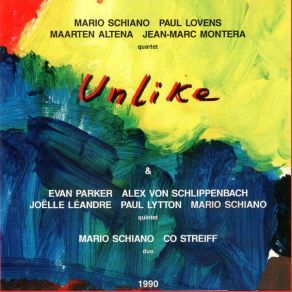Unlike
Download links and information about Unlike by Mario Schiano. This album was released in 1990 and it belongs to Jazz, Avant Garde Jazz genres. It contains 6 tracks with total duration of 01:07:34 minutes.

|
|
|---|---|
| Artist: | Mario Schiano |
| Release date: | 1990 |
| Genre: | Jazz, Avant Garde Jazz |
| Tracks: | 6 |
| Duration: | 01:07:34 |
| Buy it NOW at: | |
| Buy on iTunes $9.99 | |
Tracks
[Edit]| No. | Title | Length |
|---|---|---|
| 1. | Unlike 1st Set (featuring Mario Schiano - Paul Lovens - Maarten Altena - Jean-Marc Montera) | 25:17 |
| 2. | Unlike 2nd Set (featuring Mario Schiano - Paul Lovens - Maarten Altena - Jean-Marc Montera) | 18:01 |
| 3. | Flirt A (featuring Mario Schiano - Paul Lovens - Maarten Altena - Jean-Marc Montera) | 1:30 |
| 4. | Flirt B (featuring Mario Schiano - Paul Lovens - Maarten Altena - Jean-Marc Montera) | 2:58 |
| 5. | Trend 1st Excerpt (featuring Mario Schiano - Paul Lovens - Maarten Altena - Jean-Marc Montera) | 6:44 |
| 6. | Trend 2st Excerpt (featuring Mario Schiano - Paul Lovens - Maarten Altena - Jean-Marc Montera) | 13:04 |
Details
[Edit]Unlike features Italian sax god Mario Schiano in three different settings: quartet with Paul Lovens, Maarten Altena, and Jean-Marc Montera; a quintet with Evan Parker, Jöelle Léandre, Alex Von Schlippenbach, and Paul Lytton; and a duet with Co Strieff. Thank the heavens that Splasc(h) has an appetite for presenting Schiano like this regularly, as his diversity as a player is so wide ranging he's almost impossible to contain on a single recording. In any case, all of the music here comes from the Contradictions festival in Rome, and, therefore, Schiano was allowed to present himself to any number of combinations; these three works happened to make it onto CD. There are two pieces with each grouping, and the first quartet works best. Altena and Schiano have a near symbiotic playing relationship, and when combined with the guitar stylings of Montera, who creates silvery chord shards for both the bowed bass and Schiano to find themselves in, the music moves inward, creating languages and syntaxes that exist both outside and inside improv norms. Schiano's reliance on microtonalism never fails him, and this piece is no exception as he and Montera engage in a lengthy meditation on all the tones between B flat and C sharp. The middle pieces with Parker, Leander, and company are large moving works where sound gets pushed around a lot: big blocks of it shift from one part of the stage to the next, with Parker moving endlessly through his circular rotation of whole tones, and Leander muscles her bass through deft pizzicato angles and bowed resilience to hold her own against Von Schlippenbach. And that's the feeling that all of these musicians — Schiano excepted, who, with his consummate grace and warmth, just seems lost in trying to hold a dialogue with any of them, though he finally succeeds with Léandre — seem to be playing against one another, each trying to discover the one space they can all agree on. Sometimes it works, sometimes it doesn't. The duet setting with just the two saxophones is playful and engaging, full of bluesy Dadaism and surrealistic swing. The fact that Splasc(h) used these two tracks to bridge the gap between large groups was a very wise maneuver. In all, a fine recording that is a warts-and-all presentation of Schiano's involvement in the festival.